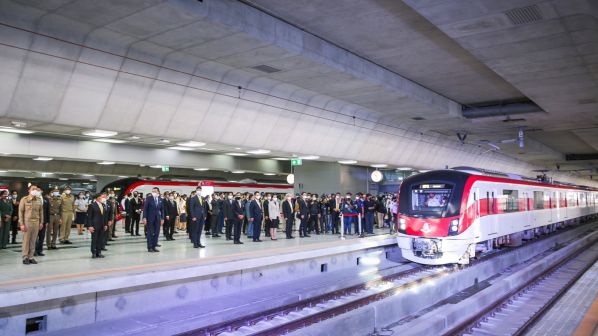The Ministry of Transport has finalized plans to submit the proposal for the inaugural extension of the Red Line electric rail system from Rangsit to Thammasat University to the cabinet, marking a significant step in expanding Thailand’s rail infrastructure. Deputy Transport Minister Surapong Piyachote revealed that this 8.8-kilometer route, connecting Rangsit to the Thammasat Rangsit campus in Pathum Thani’s Khlong Luang district, is part of a larger initiative encompassing three planned extensions.
Transport Minister Suriya Jungrungreangkit has endorsed the project, forwarding it for cabinet review following approval. However, before final approval, the Ministry of Finance, Budget Bureau, and National Economic and Social Development Council will scrutinize the plan, according to Mr. Surapong.
The Rangsit-Thammasat extension is slated to feature four stations—Khlong Neung, Bangkok University, Chiang Rak, and Thammasat Rangsit Campus—with an estimated construction cost of 6.47 billion baht. Bids for the project are anticipated to be solicited this year, with construction projected to span 35 months, targeting completion by 2028.
Further extensions originating from Taling Chan station are also on the horizon, with proposals expected to reach the cabinet by August. One extension will span 14.8 kilometers to Salaya, encompassing six stations and costing approximately 10.67 billion baht, as reported by a source within the State Railway of Thailand (SRT). Another 5.7-kilometer extension to Siriraj Hospital, comprising three stations, is estimated at 4.61 billion baht.
Contract bidding for these extensions is anticipated later this year, with construction earmarked to commence in 2025 and conclude by 2028.
Regarding technology, the SRT is deliberating on the appropriate train systems for the extensions, aligning with the government’s directives on green and cost-effective public transport solutions. According to sources, all public transport, including buses and taxis, must transition to electric power by 2029 under the government’s green policy. Diesel locomotives currently in use by the SRT will be phased out in favor of hybrid models capable of switching between electric and oil power, particularly within a 200-kilometer radius of Bangkok.
As stakeholders navigate these developments, attention remains focused on ensuring the expansion aligns with sustainability goals and enhances public transportation accessibility across Thailand’s capital region.



